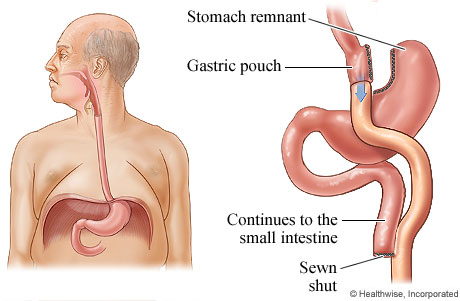Gastric bypass surgery: Overview
A gastric bypass (also called Roux-en-Y gastric bypass) is surgery to help you lose weight. It does this in two ways. First, it makes the stomach smaller. Second, it changes the connection between the stomach and the intestines. These changes help you eat less and feel full sooner.
This procedure can be done in two ways:
- By making several small cuts and using small tools and a camera to guide the surgery (laparoscopic approach).
- By making one cut (open approach).
The laparoscopic approach is used most often.
You will be asleep during the surgery. The doctor will separate the upper part of your stomach from the rest of your stomach. This forms a small pouch. This new pouch will hold the food you eat. The doctor will connect the new stomach pouch to the middle part of your small intestine. Then the doctor will close the incisions with stitches. The incisions leave scars that fade with time.
After the surgery, the food you eat will go from the small pouch to the middle part of your intestine. Food will no longer go through the lower part of your stomach or the first part of your intestines.
You will stay in the hospital 1 or more days after the surgery. In a laparoscopic surgery, most people can go back to work or their usual routine in about 2 to 4 weeks. In an open surgery, it takes 4 to 6 weeks to get back to usual routines.
Why is gastric bypass surgery done?
A gastric bypass (also called a Roux-en-Y gastric bypass) is suitable for people who are severely overweight and who have not been able to lose weight with diet, exercise, or medicine.
Surgery is generally considered when your body mass index (BMI) is 40 or higher. Surgery may also be an option when your BMI is 35 or higher and you have a life-threatening or disabling problem that is related to your weight.
It is important to think of this surgery as a tool to help you lose weight. It is not an instant fix. You will still need to eat a healthy diet and get regular exercise. This will help you reach your weight goal and avoid regaining the weight you lose.
Gastric Bypass Surgery for Obesity

Gastric bypass is surgery to make the stomach smaller and change the connection between the stomach and the intestines. The small intestine is attached to a new opening made in the stomach (above the double row of staples). The two parts of the small intestine are connected so that the unused part of the stomach can drain.
How well does gastric bypass surgery work?
Research shows that people who have gastric bypass lose more total weight than those who have gastric sleeve or gastric banding. But they also have more complications right after surgery. The long-term success is highest in people who are realistic about how much weight they will lose and who go to appointments with a medical team, follow the recommended eating plan, and are physically active.
How do you prepare for gastric bypass surgery?
Surgery can be stressful. This information will help you understand what you can expect. And it will help you safely prepare for surgery.
Preparing for surgery
- You may need to follow a clear liquid diet for several days before surgery. Your doctor will tell you how to do this.
- Be sure you have someone to take you home. Anesthesia and pain medicine will make it unsafe for you to drive or get home on your own.
- Understand exactly what surgery is planned, along with the risks, benefits, and other options.
- If you take a medicine that prevents blood clots, your doctor may tell you to stop taking it before your surgery. Or your doctor may tell you to keep taking it. (These medicines include aspirin and other blood thinners.) Make sure that you understand exactly what your doctor wants you to do.
- Tell your doctor ALL the medicines, vitamins, supplements, and herbal remedies you take. Some may increase the risk of problems during your surgery. Your doctor will tell you if you should stop taking any of them before the surgery and how soon to do it.
- Make sure your doctor and the hospital have a copy of your advance directive. If you don’t have one, you may want to prepare one. It lets others know your health care wishes. It’s a good thing to have before any type of surgery or procedure.
©2011-2025 Healthwise, Incorporated
